Charaka Indriya Sthana 12th Chapter Gomaya Churniya Indriyam
12th chapter of Charaka Indriya sthana deals about signs and symptoms of imminent death as indicated by signs like the appearance of a substance resembling cow dung powder in the head. The chapter name is Gomaya choorniya indriyam.

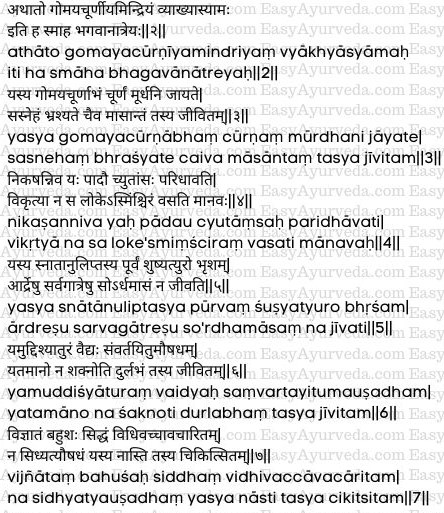
We shall now explore the chapter on “Imminent Death as indicated by signs like the appearance of a Substance resembling Cow dung powder in the Head”. Thus said Lord Atreya [1-2]
Read – Arishta Lakshanas – Ominous Signs And Symptoms Indicating Bad Prognosis
Table of Contents
Signs of imminent Death
- If an unctuous powder resembling that of cow dung appears in and falls down from the head. The patient may live for one month only.
- Morbid conditions like the rubbing of legs on the round and drooping of the shoulders of an individual while running indicate his imminent death.
- One would not live for more than a fortnight if after bath or application of unction, his chest gets dried up while the rest of the body remains wet.
- If the physician is very keen to administer a therapy to the patient, but does not succeed in preparing the medicines for the same (in spite of all the efforts to do so) or provide the treatment, such a patient hardly survives.
- If a drug which is well known for its therapeutic effects, which has been successfully tried in many other cases and which is administered according to the prescription in the scriptures, fails to produce the desired effect on a particular patient, he should be considered as beyond treatment i.e. his death is assured.
- If the diet prepared under the supervision of an experienced physician properly administered to a patient does not produce the desired effect, the patient succumbs to death. [3-8]
Read – Importance Of Diet (Pathya) For Specific Diseases
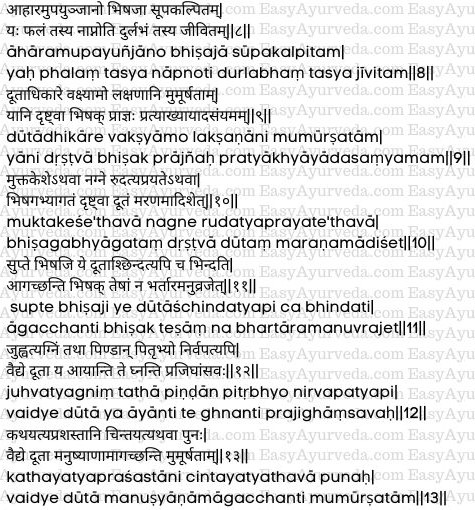
Characteristic features of messenger
Now we shall explain the signs of imminent death as indicated by characteristic features of the messenger who comes to take the physician to the patient’s house. If such signs are observed, the wise physician should reject the patient (should not treat) without hesitation (because his death would be confirmed).[9]
- If the messenger arrives at the physician’s house when the latter is dishevelled (has not combed his hairs or kept them open), naked, crying or unclean, the patient should be considered as moribund.[10]
- If the messenger arrives at the physician’s house when the latter is sleeping, is cutting something, or is breaking open something, the physician should not go towards the patient’s house or attempt to treat him or her.
- If the messenger arrives at the physician’s house while the latter is offering oblations to the fire or Pinda (balls of food) to his ancestors (as oblation) then the patient for whom the messenger was sent would succumb to death.
- The messenger of the patient who is about to die will come to the door of the physician who is hearing or speaking something inauspicious.[11 – 13]
Read – Prognosis Signs Based On The Messenger – Doota Adhishtita Arishta
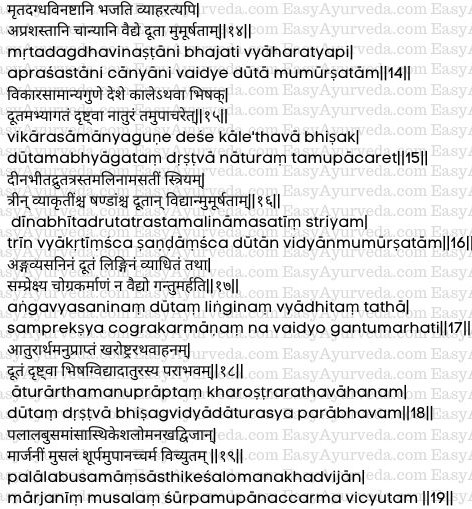
- If the messenger approaches the physician when the latter is talking about a dead, burnt or destroyed / mutilated thing or person or is speaking / discussing about inauspicious tasks or news, the patient for whom the messenger has come will die soon.
- If the messenger comes to the physician’s house or place which has attributes similar to those of the disease from which the patient is suffering, he should be considered as moribund. Example – If the patient is suffering from Raktapitta (a condition characterized by bleeding from various parts of the body) and the messenger sent by him arrives at the physician’s house when fire is burning nearby (desa) or burning mid-day (Kala), both of which have attributes similar to those of Raktapitta, the patient is sure to die.
- If the messenger is in a miserable condition, frightened, hurried, terrified and unclean or if the messenger happens to be a woman without chastity who has worn unclean clothes, or if three messengers come at a time, or if he has deformed organs (handicap) or if the messenger is an eunuch, the patient for whom such a messenger is sent is to be considered as moribund.
- If the messenger is deficient in any organs of his body, if his limbs, nose or ears have been cut (mutilated, damaged), is an ascetic, is the one who is observing chastity, or if he is indulged in cruel actives the physician should not attend the patient for whom such a messenger has come (because the patient is anyhow going to die).
- If the messenger comes in a vehicle carried by a donkey of camel (or riding a donkey or camel) or a chariot, the patient for whom he has been sent succumbs to death.
- When the physician sees the messenger for the first time, if the latter is found to be touching either straw, chaff, flesh, bone, hair of the head, small hairs of the body, nails, teeth, broom, rod meant for pounding grains, tray used for winnowing, leather pieces from shoes, grass, wood pieces, husk, charcoal, lump of earth / clay, or stone, the patient for whom he has been sent should be considered as moribund. [14 – 19]
Read – Bad Prognosis Of Diseases Based On Dreams and Shadows
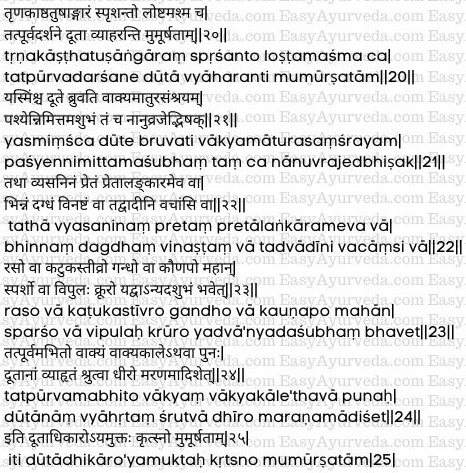
- If the physician sees bad omens while the messenger describes the condition of the patient, he should not accompany such a messenger to the patient’s house i.e. such an incident indicates imminent death of the patient.
- Similarly, if the physician comes across a sorrowful person, dead body or Pretalankara (adornments of dead persons) he should not attend the patient.
- If the physician happens to see someone (something) being cut, burnt or dead (destroyed) or the sound of statement describing such incident, or tastes which are acute and pungent, or smell which is exceedingly stinky like that of a corpse, or touch of things which are exceedingly harsh or such other sensory objects which are considered inauspicious, immediately before or during the receipt of the message or after hearing the call of the messenger, the patient for whom the messenger is sent should be considered as nearing death.
Thus, all about the signs of imminent death as indicated by the characteristic features of the messenger who comes from the patient’s house to the physician is described [20-25]
Read – Bad Prognosis Based On Smell, Touch, Taste, Colour And Voice
An incident in physician’s way to patient’s house
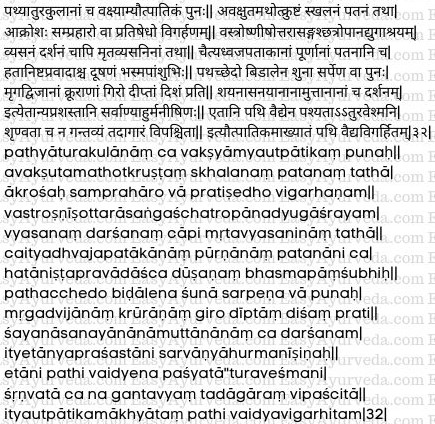
Now we shall discuss the signs of imminent death as indicated by the characteristic features of incidents in the physicians’ way to the patient’s house or at the time of arrival at his (patient’s) house.
- Sneezing, sounds of someone crying out of fear or screaming, stumbling, falling, hearing someone crying / yelling out of anger or disappointment, vision of people quarrelling or beating each other, someone preventing from going ahead or hearing of abuses.
- Some abnormalities suddenly seen in the clothes, turban, shawl, umbrella or pair of shoes such that they cannot be worn or carried or vision of relatives of the dead person who are grieving or vision of dead or grieving persons on the pathway to patient’s house.
- Falling or Caitya (religious Fig tree), flag staff, flag or pitcher filled with water, arrival of information regarding death or other inauspicious things, body getting covered or polluted by ashes or dust.
- Cats, dogs or snakes crossing the path, or hearing wild animals like jackals, vultures etc crying loudly facing southwards.
- Vision of beds, seats, vessels and vehicles which are turned upside down—all these are considered to be inauspicious by the wise.
- A wise physician who comes across these auspicious and ominous signs or hears about them in his way to the patient’s house or at the time of arrival at his (patient’s) house should not proceed further (to the patient’s house).
Thus the signs of imminent death as indicated by the characteristic features of the physician’s way to the patient’s house are described. The physician should avoid treating the patient in such situations. [25-31]
Read – How To Make Prognosis Of Disease According To Ayurveda?
Indicates while entering the patient’s house
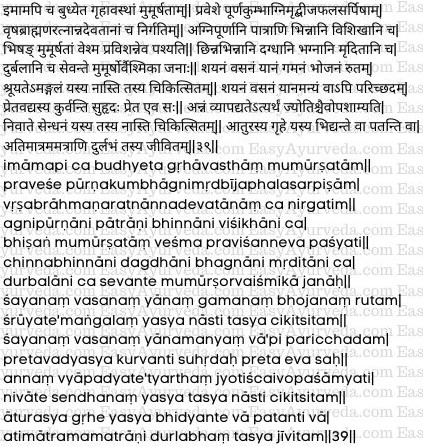
The characteristic features of the house of the moribund patient are as follows:
- At the time of entrance into the house of the moribund patient, if the physician observes the exit (from the patient’s house) of pitcher filled with water, fire, earth, seeds, fruit, ghee, a bull, a Brahmin, precious stones, prepared food or idols of the Gods it should be considered as ominous.
- Inside such a patient’s house he may see the broken vessels filled with fire (in which fire is lit) or the fire without flame and only smoke arising from the fire (extinguished fire).
- Things that are broken, cracked, burnt, split or crushed are used by important persons residing in the house of the patient who is moribund.
- If inauspicious and unpleasant things are being said about the bed, cloth, vehicle, gait / journey and food etc of the patient (inside patient’s house) the treatment of such a patient will not become successful (the patient will surely die).
- If the relatives of the patient arrange for his bed, cloth, vehicle and other apparel which are befitting for dead bodies, then the patient should be considered as already dead.
- No treatment would become fruitful in curing the patient if the food given to him becomes exceedingly rotten and the fire for him gets extinguished in spite of it being supplied with fuel in adequate quantity and the place wherein the fire is lit is devoid of wind.
- If saucers and plates often fall down and get broken in the house of a patient then his life can hardly be saved. [32-39]
Read – Bad Prognosis Based On Premonitory Symptoms Of Disease – Purvarupiya Arishta
Need and scope of repetition
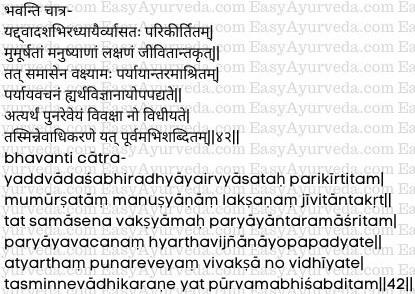
Thus, it is said:
Signs of imminent death of moribund persons described in detail in the twelve chapters will now be described in brief in a different way which elucidates their inherent meaning.
It is of course not the intention to go into the subject again in detail because such details are already described in the respective chapters. [40-42]
Signs of impending death
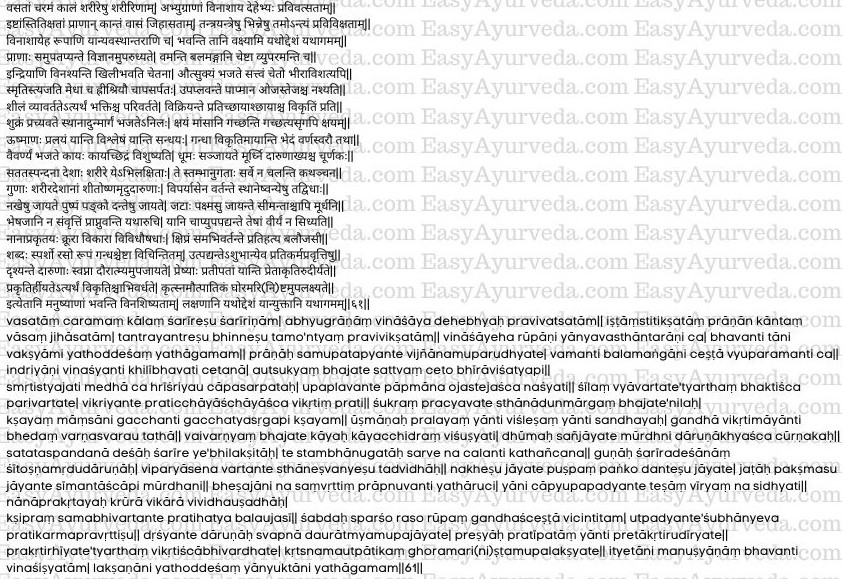
The soul who is spending his final moments in the present body in which he is located, who is enthusiastic to leave this body and travel further ahead, who is ready to get detached from the life elements which he had liked them earlier and migrate to yet another body before this body succumbs to final darkness in the form of death, the process of destruction in the body is initiated in the person who is about to enter the darkness called death after he getting detached and separated from the instruments (organs) of the body.
As proposed earlier the signs which are manifested and the modifications which take place in the individual and his soul during this time will now be described. This is based upon the scriptural authority.
Read – Atma – The Soul: Types, Life Cycle
They are as follows:
- Affliction of Prana i.e. vital breath, clouding of understanding, the parts of the body become weak and there is drainage of strength from limbs (they become less active as their functions are impaired), and there is cessation of movements.
- Destruction of sensory and motor functions (due to impairment of activities in sensory organs and motor organs).
- Impairment of consciousness
- Restlessness and anxiety in the mind about life
- Affliction of the mind with fear
- Deprivation of memory and retention power, intellect, natural modesty and lustre of the body
- Aggravation of diseases caused by sinful acts
- Destruction of Ojas and complexion
- Radical change in the conduct and character of the person
- Changes in what he likes
- Perversion and abnormality in the reflected image and lustre of the individual
- Expulsion (ejaculation) of the semen takes place even when the person is sexually not provoked or not in the sexual act
- Upward movement of Vata
- Wasting of muscle tissue and blood
- Diminution of the warmth and heat (in places wherein it should naturally be present) and development of coldness in those parts of the body
- Dislocation / laxity of joints
- Foul smell emanated from the body
- Hoarseness of voice
- Impairment of complexion / discoloration of the body
- Dryness of the orifices of the body
- Appearance as if smoke is coming from the head
- Appearance of substance like the power of cow dung in the head which is indicative of imminent death
- Complete cessation of pulsation / movements in the parts (organs) of the body which usually pulsate constantly in normal conditions
- Manifestation of attributes of opposite nature in those parts of the body which are either cold, hot, soft, or rough; and similar other features
- Appearance of flower like signs of white spots in nails and adherence of mud like substance in teeth
- Matting of eye-lashes and manifestation of Simantas i.e. lines caused by parting of hair in the head (in spite of not being manually parted)
- Difficulty in obtaining the desired drugs for preparing the medicines towards the patient and even if such drugs are obtained, their actions (and the action of the medicines made by those drugs) are not manifested in consonance with their potency
- Sudden manifestation and worsening of serious diseases of diverse types and requiring different types of treatment by overpowering the strength and Ojas (power of resistance to diseases and decay)
- Manifestation of inauspicious sound, touch, taste, vision, smells, action and thoughts in the physician while treating such patients
- Appearance of cruel dreams and manifestation of evil disposition for the patient and the people closer to him become his rivals
- Hostility of the messenger and change in complexion to that of a dead person
- Diminution of the normal characteristic features of the body, abnormality in the health status and aggravation of the morbid conditions and
- Manifestation of all the inauspicious signs all of a sudden
As proposed earlier, the signs of imminent death based on scriptural authority are described. [43-61]
Read – Lifestyle Tips For Healthy People And Patients In Ayurveda
Information on impending death to be kept secret
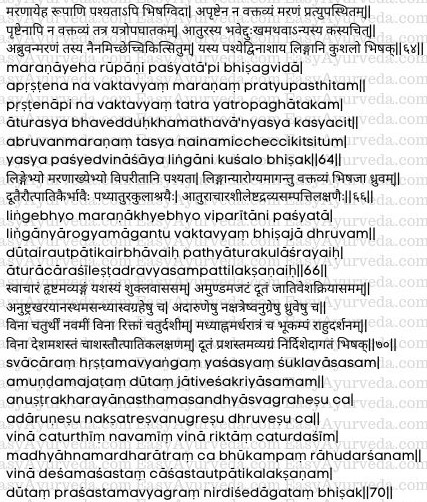
In spite of being aware of the onset of the bad prognostic signs of impending death, the physician should not announce the imminence of death without being specially requested for that. If the announcement of bad prognosis is likely to cause collapse of the patient or distress of others (relatives and friends around), the physician should not announce anything about the approaching death (of the patient) in spite of specially requested for.
The wise physician should however refrain from treating patient having signs of imminent death without making announcement of the approaching death. [62-64]
Read – Do’s and Don’ts To Follow With Your Doctor
Good prognostic signs should be disclosed
If the physician comes across auspicious signs of recovery (opposite to the inauspicious signs of approaching death) of the patient as indicated by:
– characteristic features of the messenger
– sudden manifestation of certain auspicious signs
– signs in the physician’s way to patient’s house
– characteristic features of the patient’s residence
– manner and conduct of the patient
– availability of drugs at ease
he should make this announcement positively. [65-66]
Read – Sadvritta In Ayurveda – Code Of Conduct For Healthy Life
Messengers indicating good prognosis
The following types of messengers are to be considered as auspicious that is – messenger indicative of favourable prognosis:
- he would have good conduct and pleasant behaviour
- he is not devoid of any organ of his body;
- he is of good repute and clad with white cloths;
- he has not completely shaved, he has a tuft of hair in the crown of his head and his hairs are not matted,
- he is similar in caste, dress and action to the patient,
- he has not arrived in a vehicle carried by camel or donkey;
- he has not come at the time of Sandhya i.e., morning or evening twilight,
- he has not come during inauspicious planetary positions,
- he has come at a time when cruel stars are present or during presence of dhruva star (he has come at a time when the Uttaraphalguni, Uttarasadha, Uttarabhadrapada and Rohini stars are auspicious and on auspicious Tithis i.e. dates)
- he has not come on 4th, 9th, and 14th days or rikta tithi (date) of the lunar fortnight
- he has come at a time other than the noon or midnight, when there is no earthquake and when there is no eclipse;
- he has come to a place which is not defamed and which is devoid of inauspicious characteristics;
- he is not perturbed [67-70
Read – Immunity In Ayurveda: Concept, Diet, Herbs, Medicines, Exercise
Incident on the way or while entering patient’s house indicating good prognosis
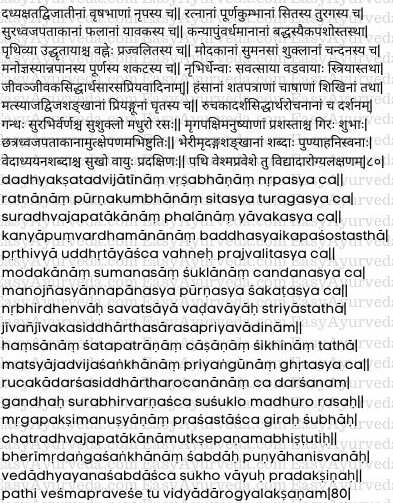
If while entering or on his way to patient’s house, the physician comes across the following, then he can predict the recovery of the patient.
- Curd
- Aksata (grains of intact rice)
- Brahmanas
- Bulls
- King
- Gems
- Pitchers filled with water
- White horse
- Flags and banners dedicated to Lord Indra
- Fruits
- Grains of barely
- Boys and girls seated on the lap (or boys, girls and earthen plate)
- An animal of good breed tied to a rope
- Cultivated land
- Kindled fire
- Sweets
- White coloured flower
- Sandal paste
- Delicious food articles and drinks
- A cart fully loaded with human beings
- A cow together with a calf
- A mare with her calf
- A woman with her child
- Cakora (cukor)
- Siddhartha
- Sarasa (crane)
- Oataka (sparrow)
- Swan
- Satapatra (parrot)
- Casa (blue joy)
- Peacock
- Fish
- Goat
- Elephant tusk
- Priyangu (Callicarpa macrophyla Vahl)
- Ghee
- Rucaka (ornaments of horses)
- Mirror
- White mustard
- Gorocana (bile of cow)
- Fragrance
- Things having white colour
- Sweet taste
- Sweet and auspicious voices of animals, birds and human beings
- Unfolding of umbrellas, flags and banners
- Prayers
- Sound of cattle drums, drums and conches
- Punyaha (auspicious sounds)
- Sounds of vedic recitations and soothing wind from the South direction. [71-80]
Read – Shloka (Verses) To Relieve Microbes As Described By Sushruta
Signs of good prognosis
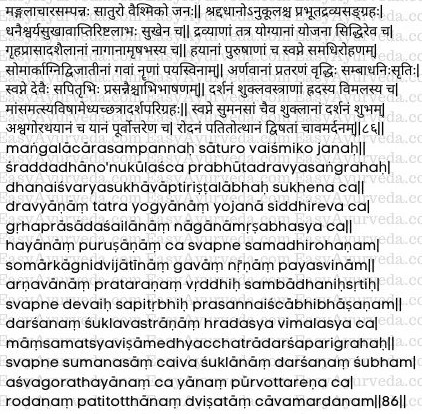
The following are the auspicious signs indicative of a sure success in the treatment of a patient –
- Engagement in auspicious acts, faithfulness and favorable disposition of the patient and his kinsmen;
- Collection of adequate funds and other accessories
- Attainment of wealth, power and happiness
- Easy availability of desired things
- Easy availability of drugs in abundance and availability of different methods of preparing medicines from them and using them, favourable effect of these drugs when administered and
- Dreams like (a) climbing on the roof of the house, palace, hill, elephant, bull, horse and human being (b) vision of the moon, the sun, fire, Brahmana, cow and man of repute, (c) swimming in the ocean; (d) improvement of health, (e) end of sufferings, (f) dialogue with the gods and forefathers in their pleasing mood (g) vision of white garments and a clean lake, (h) obtaining of meat, fish, poison, unclean objects umbrella and mirror (i) vision of white flowers (j) riding of horses, bulls and chariots and moving towards the north-east, (k) weeping; (l) rising after fall and (m) subjugation of enemies [80-86]
Read – Achara Rasayana – Behavioral Therapy For Calm Mind And Long Life
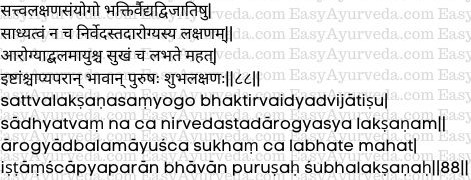
Moreover, appearance of noble qualities, faithful, devotion to physicians and Brahmana, subjective feeling of curability of diseases, freedom from anxiety constitutes the signs and symptoms of quick recovery from illness. A man of auspicious characteristics attains strength, longevity, happiness and other desirable objects only when he possesses good health. [87-88]
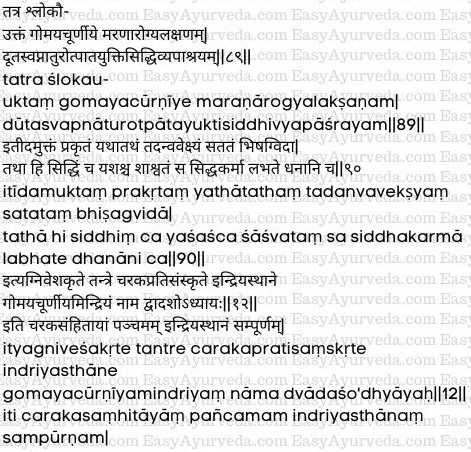
To sum up:-In this chapter on “Imminent death as indicated by signs like the appearance of substance resembling cow dung powder in the head”, signs and symptoms of imminent of the patient, accidental happenings, reasoning and accomplishments of success are described. [89]
Read – 16 Factors To Watch For A Healthy Mind And Body
Utility of the knowledge
Signs and symptoms described in this chapter should always be properly studied by the physician. It is only then that a physician can attain success, fame and wealth as well as accomplishment through treatment. [90]
Thus ends the 12th chapter on “Imminent death as indicated by signs like the appearance of a substance resembling cow-dung powder in the head” of the Indriya Section of Agnivesha’s work as redacted by Charaka










